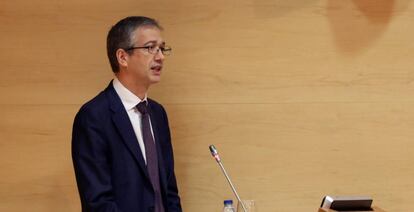Bank of Spain calls for cuts, predicts bigger slump
Governor Pablo Hernández de Cos asks lawmakers for a reform program spanning several political terms in order to avoid a new debt crisis in the wake of the coronavirus recovery effort

Spain’s two main independent institutions have issued warnings about the steps that must be taken to avoid a debt crisis that could drag down the economy in the wake of the coronavirus recovery effort.
First it was the Fiscal Authority, the agency that monitors the public accounts, that said it will take a decade of adjustments to make up for public-debt levels that could soar to 124% of GDP by 2021.
And on Monday, the Bank of Spain asked for a gradual, mid-term adjustment plan to be introduced once the worst of the pandemic has passed. This plan, which should have broad political backing to convince the markets, would probably involve spending cuts and tax hikes.
Bigger slump
In a congressional appearance, Bank of Spain governor Pablo Hernández de Cos also revised the institution’s previous economic forecast downwards. Instead of retreating 6% – the scenario contemplated a month ago – the economy is now expected to slump by anywhere between 9% and 13% as a result of the coronavirus lockdown.
Activity will not have recovered by late 2021, and there is a risk of even “more unfavorable” scenarios due to the uncertainty caused by the Covid-19 pandemic, according to the Spanish central bank’s latest analysis.
On Monday, the governor warned lawmakers that a mid-term strategy stretching over several years will be required to fill the budgetary gap created by the crisis, and to prevent debt levels from becoming “an excessive burden on current and future generations.”
Hernández de Cos supported the government’s current stimulus program aimed at helping struggling households and businesses. But the cost of maintaining this kind of aid will be very high, he said. Debt could soar to around 120% of GDP and it will not be enough to implement a European-wide solution.
What’s required from Europe is “a risk-sharing scheme to finance states in comparable conditions beyond the European Central Bank [ECB],” he said. For now, this could be achieved with a reconstruction fund to finance the costs generated by Covid-19. But a mid-term national plan is of the essence, the governor insisted. “The magnitude of the challenge is significant,” he said. “We’re going to have to row against the tide.”
Spain’s structural deficit was 3% of GDP at the close of 2019, noted the governor. To this will soon be added several tenths of a point due to the higher expenditure on healthcare, two or three tenths more due the cost of debt, a few tenths more for the government’s planned minimum guaranteed income scheme, and one whole point throughout the coming decade due to pension payments, after the previous government’s pension reform was scrapped.
Some expenditures that encourage growth will have to be preserved, such as education and R&D, which represent around 5% of GDP or €60 billion. “What’s required is an adjustment of half a point of GDP starting in 2022,” said Hernández de Cos. This would mean €6 billion a year.
Plan now, act later
The governor insisted on the idea of designing the action plan now, and implementing it after the worst of the coronavirus crisis is over. It is important to craft “a political pact spanning several terms.” Only such a program, backed by a majority of parties and detailing the action to be taken over the course of several years, could be deemed credible by the markets, said the governor.
Hernández de Cos has voting rights at the ECB, which has doubled its acquisition of Spanish debt in order to keep down the bond spread following a controversial ruling by the German Constitutional Court on the ECB’s main bond purchase program. But the ECB will not be able to keep borrowing costs down all by itself, and “national politics must provide support.”
While the governor did not say so specifically, his recommendations for reviewing spending efficiencies and expanding the tax base translate into spending cuts and higher taxes.
Hernández de Cos also asked lawmakers for an ambitious agenda of structural reforms that were already necessary in Spain before the coronavirus crisis. In a country with persistently high unemployment, low growth and an aging population, these reforms take on added urgency in the present situation.
The governor noted that Spain is especially vulnerable to the effects of the lockdown because of the economy’s reliance on the tourism industry, and that “sector restructuring” must be facilitated. As for the banking sector, although it is better prepared than others, it could still face serious risks, said the governor, if the effects of the crisis extend for a long time.
English version by Susana Urra.
Tu suscripción se está usando en otro dispositivo
¿Quieres añadir otro usuario a tu suscripción?
Si continúas leyendo en este dispositivo, no se podrá leer en el otro.
FlechaTu suscripción se está usando en otro dispositivo y solo puedes acceder a EL PAÍS desde un dispositivo a la vez.
Si quieres compartir tu cuenta, cambia tu suscripción a la modalidad Premium, así podrás añadir otro usuario. Cada uno accederá con su propia cuenta de email, lo que os permitirá personalizar vuestra experiencia en EL PAÍS.
¿Tienes una suscripción de empresa? Accede aquí para contratar más cuentas.
En el caso de no saber quién está usando tu cuenta, te recomendamos cambiar tu contraseña aquí.
Si decides continuar compartiendo tu cuenta, este mensaje se mostrará en tu dispositivo y en el de la otra persona que está usando tu cuenta de forma indefinida, afectando a tu experiencia de lectura. Puedes consultar aquí los términos y condiciones de la suscripción digital.









































